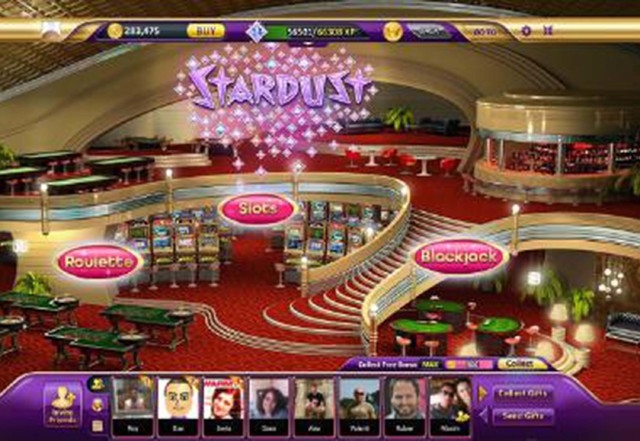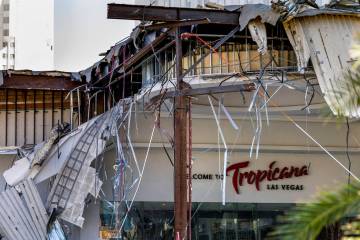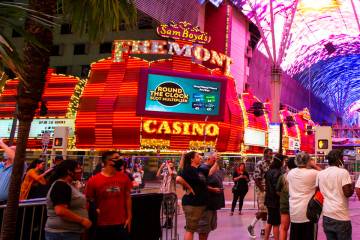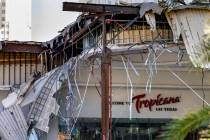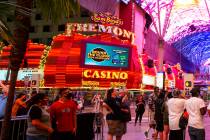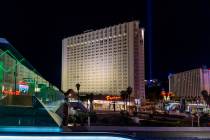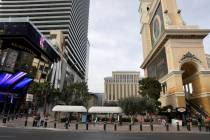Stardust casino lives again on free-to-play social gaming site
The Stardust is coming back.
Kind of.
And, as far as we know, without the mob.
The Strip casino, which was the center of organized crime’s skimming operations in the 1970s and 1980s, was imploded in 2007.
Now, the resort is immortalized on the Internet as Stardust Casino, a free-to-play social gaming site accessible through Facebook. Stardust Casino was created by WIN — the social gaming arm of Gibraltar-based online gambling giant Bwin.party — and Boyd Gaming Corp.
The site is currently available on Facebook in the United Kingdom, Canada and Australia. A U.S. version of the social game is expected to launch in a few months.
“Our aim was to recapture the romance and adventure of vintage Las Vegas, and what better way to do that than to re-create online the legendary Stardust Casino?” Win CEO Barak Rabinowitz said in a statement.
The site attempts to replicate the nostalgia of the Stardust, with high-definition 3-D recreation of the casino’s lobby and offering free-to-play games, including slot machines, blackjack and roulette. Gamblers have the opportunity to rise from novice to high roller while earning experience points.
However, it’s uncertain if Win is going to bring back some the casino’s more notorious history such as allowing players to “skim” free-play gaming tokens or find themselves subject to FBI wiretaps while playing on the site.
Before Boyd Gaming took over the casino in 1984 at the request of state gaming regulators and buying the resort in 1985, the Stardust had a somewhat colorful history.
The Stardust was built in 1958 by mob associate Tony Cornero and was, at the time, the state’s largest casino. In the 1970s, when it was owned by the organized crime-influenced Argent Corp., the Stardust became home to bookmaker Frank “Lefty” Rosenthal and mob enforcer Tony Spilotro.
After federal authorities forced Argent out of business, the casino was sold to businessmen Al Sachs and Herb Tobman. However, state gaming regulators found instances of skimming still taking place and a $3 million fine was levied against the owners.
Boyd took over the Stardust, expanded the resort with a 32-story tower, and operated the property until 2007. The casino was demolished to make way for the $4.8 billion Echelon project, which Boyd abandoned a year later as the recession dried up credit markets.
Boyd Gaming sold the site earlier this year to Malaysia-based Genting Group for $350 million. Genting is planning the $2 billion to $7 billion Resorts World Las Vegas for the location.
Meanwhile, the Stardust lives on through social gaming.
“The Stardust represents everything that was great about the early days of Las Vegas, and we are proud to work with Boyd Gaming to help bring this legendary brand back to life,” Rabinowitz said.
Boyd Gaming Executive Vice President Bob Boughner said Win did “a fantastic job” to recapture some of the Stardust’s gaming experience.
“This game is truly a worthy successor to the legendary Stardust name,” Boughner said.
Analysts thought the social gaming collaboration by Boyd and Bwin.party was a good idea, since the companies are also partners in potential legal online gaming operations in Nevada and New Jersey. Bwin.party is awaiting licensing in Nevada.
“The (Stardust) brand likely still resonates with casino customers,” Union Gaming Group Managing Director Bill Lerner said. “While we don’t expect the free application to materially impact Boyd’s profits and losses, we think it is a good move to build an online gaming brand ahead of potential state or federal regulation of online gaming.”
Contact reporter Howard Stutz at hstutz@reviewjournal.com or 702-477-3871. Follow @howardstutz on Twitter.



